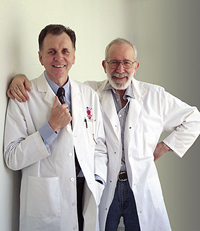2005 Nobel Prize in Physiology or Medicine


Barry Marshall (left) and Robin Warren (right)
On his birthday in 1979, Robin Warren, a pathologist with an interest in gastric ulcers, noticed spiral-shaped bacteria wherever he saw signs of inflammation in biopsies from patients with gastritis and ulcers. When Barry Marshall, who had recently completed his medical training, decided to find a research project, he talked to Robin Warren about his unusual observations.
Working together at the Royal Perth Hospital, over the following years their research showed that bacteria, not stress or lifestyle, caused the majority of gastric ulcers. It defied accepted wisdom that the stomach was too acidic to allow bacteria to survive, grow and cause disease. Their work was to rewrite the text books and go on to earn the greatest scientific prize of all, the Nobel Prize.
The discovery has led to a greater understanding of the link between chronic infection, inflammation and cancer. Doctors world-wide routinely treat patients who suffer from painful ulcers with a simple course of antibiotics.
Since then, Warren has retired, but Marshall continues his research at the University of Western Australia on the bacteria that causes gastric ulcers.
They traveled to Stockholm in December 2005 to receive the award from the Nobel Committee. And it all started as an interesting observation by Warren on his birthday.





